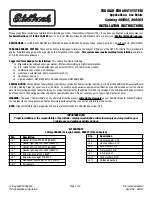
During this period:
Avoid full-throttle starts and rapid
acceleration.
We recommend gasolines containing
detergent additives that help prevent
fuel system and engine deposits.
Avoid hard braking. New brakes
need to be broken-in by moderate
use for the first 200 miles (300
km).
Open the fuel fill door by pushing
on the handle to the left of the
driver’s seat.
Help assure your car’s future
reliability and performance by paying
extra attention to how you drive
during the first 600 miles (1,000 km).
Because the fuel fill cap is on the
driver’s side of the car, park with
that side closest to the service
station pumps.
In Canada, some gasolines contain
an octane-enhancing additive called
MMT. If you use such gasolines,
your emission control system
performance may deteriorate and
the Malfunction Indicator Lamp on
your instrument panel may turn on.
If this happens, contact your
authorized Honda dealer for service.
Using gasoline containing lead will
damage your car’s emissions
controls. This contributes to air
pollution.
You should follow these same re-
commendations with an overhauled
or exchanged engine, or when the
brakes are relined.
Do not change the oil until the
recommended time or mileage
interval shown in the maintenance
schedule.
Your Honda is designed to operate
on unleaded gasoline with a pump
octane number of 86 or higher. Use
of a lower octane gasoline can cause
a persistent, heavy metallic rapping
noise in the engine that can lead to
mechanical damage.
1.
2.
Bef ore Driving
Break-in Period
Gasoline
Filling the Fuel Tank
Break-in Period, Gasoline, Service Station Procedures
204
Push
















































